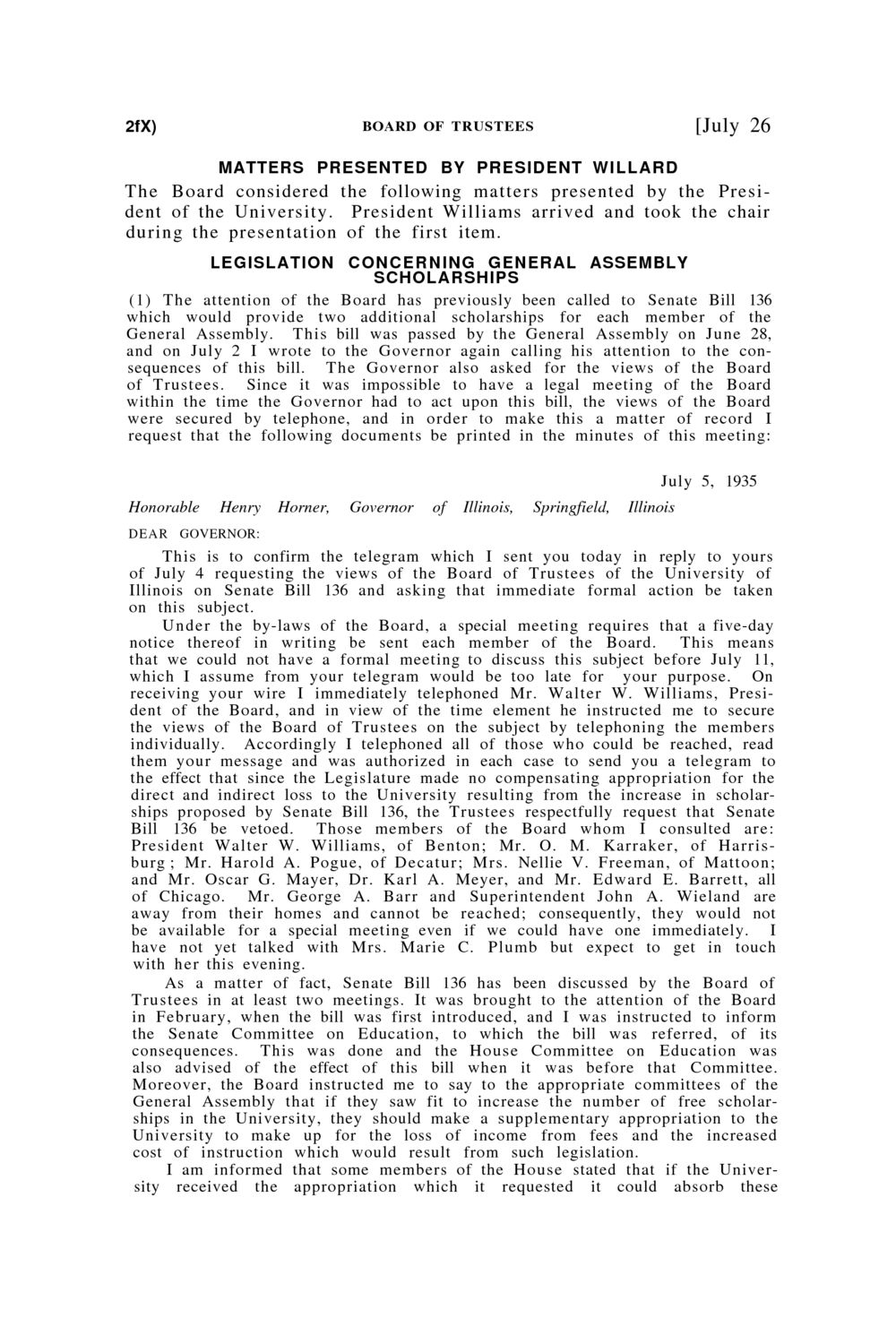| |
| |
Caption: Board of Trustees Minutes - 1936
This is a reduced-resolution page image for fast online browsing.

EXTRACTED TEXT FROM PAGE:
2fX) BOARD OF TRUSTEES [July 26 MATTERS PRESENTED BY PRESIDENT WILLARD T h e Board considered the following matters presented by the President of the University. President Williams arrived and took the chair during the presentation of the first item. LEGISLATION CONCERNING GENERAL ASSEMBLY SCHOLARSHIPS (1) T h e attention of the Board has previously been called to Senate Bill 136 which would provide two additional scholarships for each member of the General Assembly. This bill was passed by the General Assembly on June 28, and on July 2 I wrote to the Governor again calling his attention to the consequences of this bill. T h e Governor also asked for the views of the Board of Trustees. Since it was impossible to have a legal meeting of the Board within the time the Governor had to act upon this bill, the views of the Board were secured by telephone, and in order to make this a matter of record I request that the following documents be printed in the minutes of this meeting: July 5, 1935 Honorable Henry Horner, Governor of Illinois, Springfield, Illinois DEAR GOVERNOR: This is to confirm the telegram which I sent you today in reply to yours of July 4 requesting the views of the Board of Trustees of the University of Illinois on Senate Bill 136 and asking that immediate formal action be taken on this subject. Under the by-laws of the Board, a special meeting requires that a five-day notice thereof in writing be sent each member of the Board. This means that we could not have a formal meeting to discuss this subject before July 11, which I assume from your telegram would be too late for your purpose. On receiving your wire I immediately telephoned Mr. Walter W. Williams, President of the Board, and in view of the time element he instructed me to secure the views of the Board of Trustees on the subject by telephoning the members individually. Accordingly I telephoned all of those who could be reached, read them your message and was authorized in each case to send you a telegram to the effect that since the Legislature made no compensating appropriation for the direct and indirect loss to the University resulting from the increase in scholarships proposed by Senate Bill 136, the Trustees respectfully request that Senate Bill 136 be vetoed. Those members of the Board whom I consulted are: President Walter W. Williams, of Benton; Mr. O. M. Karraker, of Harrisburg ; Mr. Harold A. Pogue, of Decatur; Mrs. Nellie V. Freeman, of Mattoon; and Mr. Oscar G. Mayer, Dr. Karl A. Meyer, and Mr. Edward E. Barrett, all of Chicago. Mr. George A. Barr and Superintendent John A. Wieland are away from their homes and cannot be reached; consequently, they would not be available for a special meeting even if we could have one immediately. I have not yet talked with Mrs. Marie C. Plumb but expect to get in touch with h e r this evening. As a matter of fact, Senate Bill 136 has been discussed by the Board of Trustees in at least two meetings. It was brought to the attention of the Board in February, when the bill was first introduced, and I was instructed to inform the Senate Committee on Education, to which the bill was referred, of its consequences. This was done and the House Committee on Education was also advised of the effect of this bill when it was before that Committee. Moreover, the Board instructed me to say to the appropriate committees of the General Assembly that if they saw fit to increase the number of free scholarships in the University, they should make a supplementary appropriation to the University to make up for the loss of income from fees and the increased cost of instruction which would result from such legislation. I am informed that some members of the House stated that if the University received the appropriation which it requested it could absorb these
| |